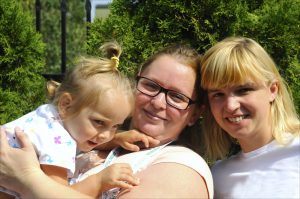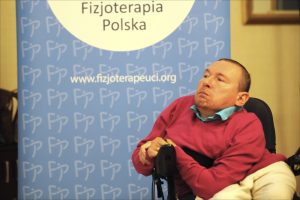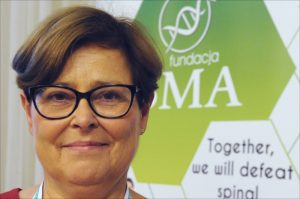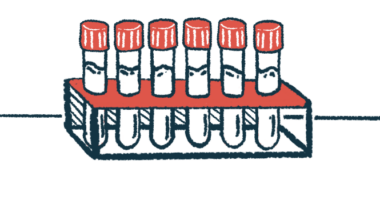SMA Patients Meeting in Poland Demand Access to ‘Lifesaving’ Spinraza
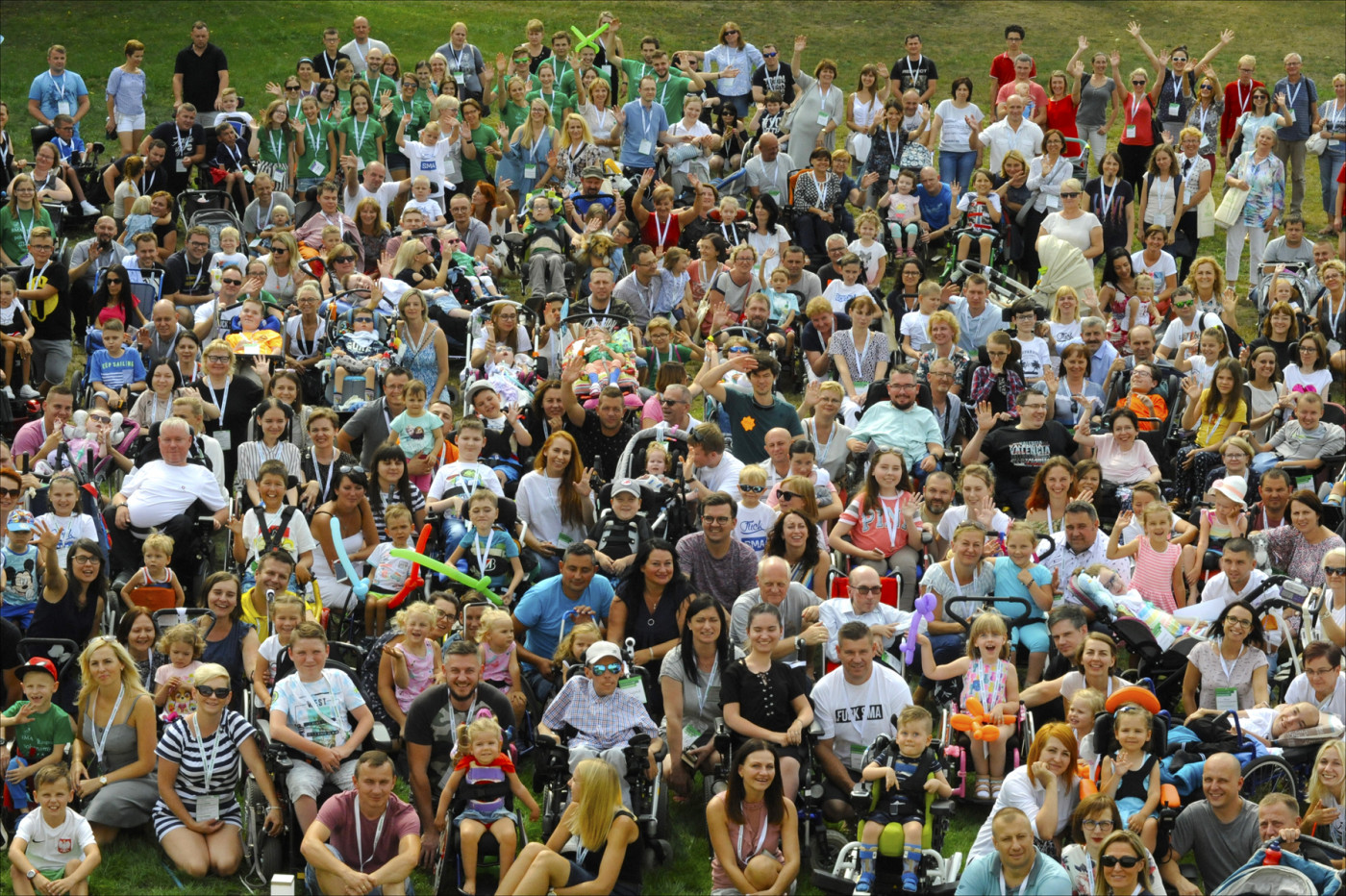
Hundreds of SMA patients and their caregivers gather in Warsaw in 2018. (Photo by Larry Luxner)
Zosia Malkowska looks and acts like a perfectly healthy, happy 2-year-old. No one observing the girl — whose antics stole the show at the opening of last week’s 6th Polish SMA Conference in Warsaw — would guess she had been born with spinal muscular atrophy (SMA).
That’s because Zosia is relatively lucky. Her older brother, Oscar, was diagnosed with SMA type 2 when their mother, Monika Malkowska, was 23 weeks pregnant with Zosia. As a result, at 5 months she started receiving Spinraza (nusinersen) for free in France, under an Extended Access Program (EAP) offered by Biogen, the treatment’s manufacturer.
“Our life has changed so much. Zosia is today a healthy child,” said her mother, as the family’s doctor, Karolina Aragón-Gawinska, translated from Polish to English. “As soon as I learned that Zosia also had SMA, we did what we had to do. We didn’t think much about it. As their mother, I’d like to appeal to the profession for better access to treatment. This is so incredibly important.”
In order to get Spinraza for Zosia, the entire family had to leave their home and their jobs in Poland and move to Paris, where the girl’s father works in construction. They plan to stay in France for the foreseeable future, at least until the therapy is available in Poland.
“I was on the verge of tears when I heard their stories,” Aragón-Gawinska said. “So many Polish families have quit their jobs overnight and resettled in France just to save the lives of their children.”
Zosia, who was born with three copies of the SMN2 gene, was tested twice in Poland and once again in France to reconfirm the diagnosis. The toddler has since received eight Spinraza injections over an 18-month period.
Interested in SMA research? Check out our forums and join the conversation!
“She received the drug before she had any symptoms, and that is why she’s now how she is,” Aragón-Gawinska said. “From what we can tell now, she is like any other normal baby.”
Emigrating for treatment
Organizers of the Aug. 23-25 conference — sponsored by Apco, Bjeska, Invicta, Ottobock and other European healthcare companies — wish there were more stories like Zosia’s.
The meeting, attended by more than 400 people and hosted by the Warsaw-based nonprofit Fundacja SMA, coincided with SMA Awareness Month worldwide. It began with a minute of silence for those who had lost their battle with this disease since last year’s gathering.
But others weren’t present precisely because they’ve left Poland in search of Spinraza, said Marek Plura, an opposition party lawmaker in Poland and member of the European Parliament who has SMA type 2. He’s also a husband and the father of two children.
“They departed to other countries, and their children of various ages are now getting treated,” said Plura, 48. “We could say it’s a good thing they’re not here, because they’ve found a place where their prayers have been answered. And for those of us who are here, the fact our deputy prime minister is with us gives us hope that we’re not going to have to leave the country too.”
Indeed, the presence of that official, Jozefa Szczurek-Zelazko, was reassuring to many who are growing impatient with the Polish government’s hesitation in offering its citizens reimbursement for Spinraza, one of the world’s most expensive therapies.
The treatment — which on the U.S. market retails for $750,000 for the first year and $375,000 each year thereafter — isn’t yet available on Poland’s national health system, although it was approved for all EU member states in 2017. Only those patients like Zosia who are covered for “compassionate use” under an EAP, or those whose families have emigrated to other EU countries that do cover it, like Germany or Belgium, are able to access it at an affordable rate.
“I come from Silesia, a region of Poland from where people traditionally left for France and Germany to earn their daily bread. Today they emigrate to become citizens of countries where treatment is available and reimbursed,” said Plura, speaking from a wheelchair on stage.
“We know this treatment is very costly, but there’s a nuanced difference in Polish between ‘costly’ and ‘valuable’,” he said. “Every life is valuable. I hope we’ll soon find the resources so that all who need it will have access to this drug — not only west of the Oder River [which forms part of Poland’s western border with Germany], but also here, on the banks of the Vistula.”
SMA Foundation lauds ‘breakthrough’
Many bureaucratic hurdles remain, however. Pawel Petrich, a volunteer with Fundacja SMA and the father of a 2-year-old boy with SMA type 1, said “we are witnessing a breakthrough” in treatment possibilities.
“Experts tell us that the kind of dynamics we’ve seen over the last 24 months are unprecedented in the landscape of any rare disease,” he said. “Miracles have appeared on the horizon. They have become visible but not reachable. We can’t yet access nusinersen. There’s still some way to go, but thanks to our promotional activities, we were able to achieve a very positive opinion by a committee of the Polish Ministry of Health, which recommends nusinersen treatment for all SMA patients regardless of type or age.”
Earlier this month, a committee of Britain’s independent, government-funded National Institute of Health and Care Excellence (NICE) recommended against reimbursement of Spinraza to treat SMA in England, Wales and Northern Ireland because of the therapy’s “extremely high cost.”
Some 50 babies are born with SMA every year — half with type 1 — in Poland, whose population of 38 million makes it the largest EU member nation in Eastern Europe.
At the moment, 518 people are listed on Poland’s official SMA registry, said Barbara Steinborn, MD, president of the Polish Society of Child Neurologists and one of the country’s top SMA experts; 89 percent of them have had their diagnosis confirmed by genetic testing.
“SMA type 1 symptoms start very early, in the first six months of life, and they always worsen. The course is dramatic and tragic, and children die early due to complications of the lower respiratory system. Up until now, we’ve had no drug which could treat this disease,” she said.
“But this is the 21st century, and I have never seen such a revolution in treatment in my 30 years of practice. We look forward to the possibility of administering this drug to children, in order to prevent clinical symptoms from developing. And this is why we can say it’s lifesaving.”




